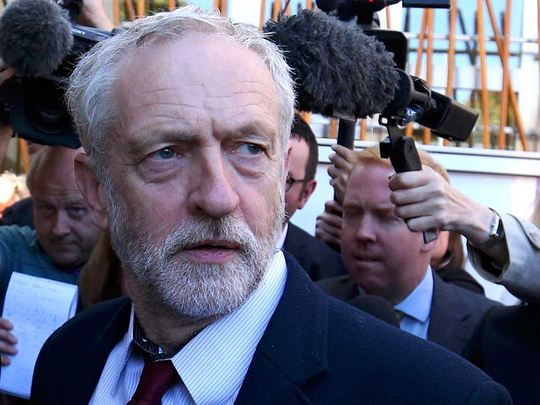
The timing was unforgiving. To go straight from the most dramatic insurgent party election in Britain’s political history into a traditional seaside party conference was always going to be a bit like jumping off a moving train. But despite the rocky first days of Jeremy Corbyn’s leadership and the dire warnings of disaster, Labour’s Brighton jamboree defied expectations. There was no meltdown. The disinherited Blairites and their media cheerleaders continued to run around like headless chickens, insisting what had happened was the most terrible mistake. But the caravan moved on regardless.
Labour has emerged from its extraordinary upheaval as an unambiguously anti-austerity party. The breakdown of European politics triggered by the crash of 2008 has now reached the whole of Britain. There is, it turns out, an alternative after all.
On austerity and the economy at least, Corbyn and McDonnell have won majority support among their MPs — Corbyn’s new shadow chancellor, John McDonnell, trailed as the Irish Republican Army-loving ogre of Hayes and Harlington, delivered a studiedly sober account of the new Labour leadership’s central economic project. He combined an unmistakable break with failed austerity economics with a pledge to close the deficit through investment-led growth and a crackdown on corporate tax-dodgers, instead of “on the backs of middle and low earners”.
The expectation was then that the new leader himself would fall apart at the podium. Instead, Corbyn brought delegates to their feet with his appeal to popular decency and solidarity, his rejection of illegal war-making and Trident renewal and his unqualified opposition to the new benefit and tax credit cuts about to be imposed on millions across Britain.
But he was talking only to the true believers, declared the experts who had failed to foresee Corbyn’s runaway election. That hardly squared with his call for new rights for the self-employed, small businesses and homeowners. But in any case, the Labour leader needs to secure his back in his own party, as well as appeal to the voters who abandoned Labour or stayed at home at the May general election.
The risk of an early attempted coup has receded, but the gap between Corbyn and most of his MPs is stark. The evidence from the last few days is that, on austerity and the economy, at least, Corbyn and McDonnell have won majority support among their MPs and “big tent” shadow cabinet — even if every shift towards the policies the Labour leader was elected on, from benefit cuts to free schools, is a haggle. But when it comes to the British state’s international and military commitments that Corbyn has challenged or called to be reformed — from nuclear weapons and the European Union to US-led bombing campaigns — the resistance of the Labour establishment has been vocal and determined.
That came to a head on Wednesday over Corbyn’s opposition to Trident renewal — just as the conference voted to reject the bombing of Syria without United Nations authorisation. The £100 billion (Dh558.9 billion) nuclear weapons upgrade controversy had been kept off the agenda. But when the new Labour leader acknowledged what anyone might have guessed — that there were no circumstances in which he could foresee authorising the use of Trident as prime minister — he was roundly denounced by his own shadow defence secretary, Maria Eagle.
Corbyn was in reality only acknowledging the emperor’s new clothes status of Britain nuclear weapons: That they are neither independently, plausibly nor legally usable in any conceivable 21st century conflict, but are instead an exorbitantly expensive hi-tech make-work scheme and status symbol for British officials.
But for politicians who measure their own importance by their loyalty to Cold War institutions, these are existential red lines. And they will be exploited to the full by the Conservatives, who plan to use one parliamentary vote after another to divide the opposition and weaken Labour’s new leader. The first can be expected to be on bombing Syria, for which Corbyn’s opposition now has official Labour Party backing.
That won’t stop some Labour MPs from voting with Cameron, though. The risk of an early attempted coup against Corbyn may have receded. But the gap between the party’s leader, elected by hundreds of thousands, and the majority of its MPs, who didn’t vote for him, is stark. Corbyn and his supporters are effectively insurgents in their own party.
The gulf can be bridged for a while with the new leader’s enthusiasm for debate and pluralism. But the risk is that could sap the authority Corbyn won from his huge mandate and leave the Labour leader as one leading voice among many, pulling political levers that no longer work.
Fortunately for those who want to see Labour offer a popular political alternative, there’s already evidence that clear leadership can win the support among Labour MPs he and McDonnell need. That can be reinforced by mobilising the new mass membership, if necessary with members’ ballots.
Corbyn has already had to make compromises of course, for example over giving Cameron a blank cheque on the European Union referendum. But there have also been clear policy advances in Brighton: On rail nationalisation, council house building and Middle East war-making.
The conventional media and political wisdom is that Corbyn’s Labour is a kamikaze operation that will never attract enough support to win a general election. Certainly, relentless opposition from Labour grandees who struggled to attract 5 per cent of their own members isn’t much help. But as the Tories prepare to whoop with delight at their own conference next week, they face potential upheavals of their own: Over Europe, the brutal cuts that will hit their own voters — and the prospect of renewed economic crisis in the years to come.
Better not whoop too soon.
— Guardian News & Media Ltd









